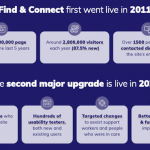Correcting the Record
- Feb 28, 2020
- In Features
One of the recommendations from the Royal Commission into Institutional Responses to Child Sexual Abuse was that people who were in care be given the right to respond to the records that were created about them – “Individuals’ existing rights to access, amend or annotate records about themselves should be recognised to the fullest extent”.
Records that were created about children in care do not necessarily reflect the personality, capability or experience of the child. Some of them are cruel. Many are missing important information, or are incorrect about things that are important to the people they were created about.
The ability to change the narrative of records to reflect the true experience of the child in care is important – to correct factual inconsistencies, to be allowed a right of reply, or to explain the circumstances that led to records being kept (for example, children could be considered stupid or labelled as ‘morons’ when they were trying to cope with significant trauma or denied adequate education; some were labelled with behavioural issues for trying to escape abuse, etc). Where families or researchers may have the right to access records, adding additional information or challenging what is there can be an important way of correcting the record.

Excerpt from behaviour record submitted to the Royal Commission into Institutional Responses to Child Sexual Abuse
This isn’t true for everyone who was in care – some do not want to engage with the records that were created about them, others don’t want to engage with the organisations that were responsible for creating the records, still others reject the legitimacy of these records. There are numerous reasons for people who spent time in care as children not wanting to access or annotate the records that were created about them.
For those that do wish to take up this option, annotating records to correct wrong or misleading information is covered by Freedom of Information or Privacy laws. For recordkeeping organisations that want to improve records access, processes that build on this legislation can be developed to make it easier for those who want to annotate their records.
For more general info about records access see Applying for Records: Your Rights and the Law https://www.findandconnect.gov.au/resources/your-rights/
More on records advice from the royal commission: https://www.findandconnect.gov.au/records-advice-from-the-royal-commission/
What to expect when accessing records about you:
https://www.findandconnect.gov.au/resources/what-to-expect-when-accessing-records/
If you would like some help in finding and accessing records that were created about you, contact a Find & Connect Service in your state or territory





